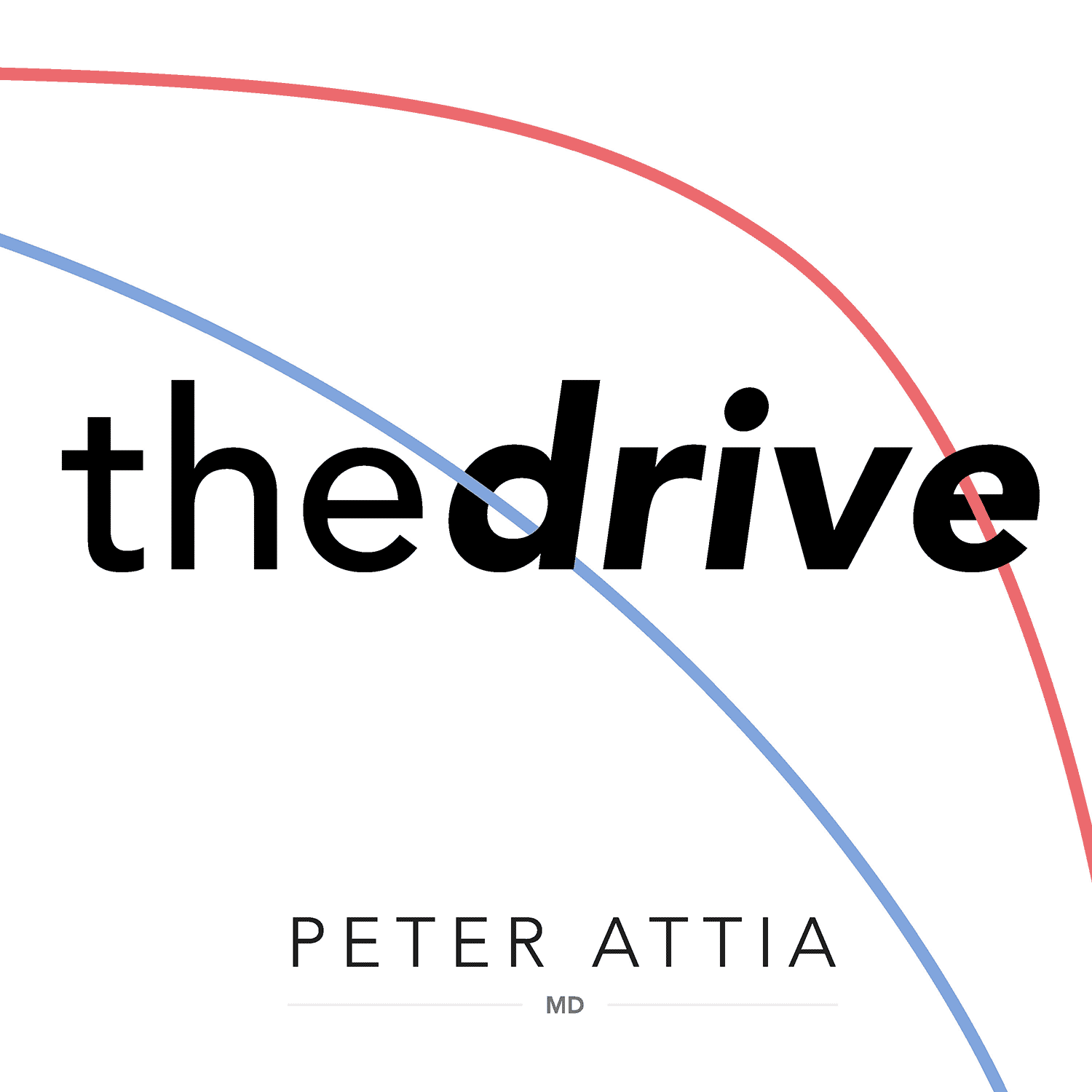
February 10, 2025 • 2hr 51min
#335 ‒ The science of resistance training, building muscle, and anabolic steroid use in bodybuilding | Mike Israetel, Ph.D.
The Peter Attia Drive

Key Takeaways
- Resistance training benefits can be achieved in just 1-3 hours per week when done properly with compound movements and appropriate intensity
- Most people don't need more than 30 minutes twice per week of resistance training to get significant health and aesthetic benefits
- Training intensity is critical - need to get within 1-2 reps of failure to stimulate muscle growth effectively
- Volume needs vary by experience level but generally 10-20 sets per muscle group per week is sufficient for most people
- Compound exercises like squats, deadlifts, presses are most time-efficient as they work multiple muscle groups simultaneously
- Recovery between sessions is crucial due to both muscular and neurological fatigue
- Genetics play a major role in muscle building potential and response to training
- Consistency in both training and nutrition is more important than perfection
- Anabolic steroid use can add significant muscle mass but comes with health risks and trade-offs
Introduction
Mike Israetel is a sports physiologist, competitive bodybuilder, and co-founder of Renaissance Periodization. He holds a PhD in Sport Physiology and was formerly a professor of Exercise Science. In this episode, Mike shares his expertise on resistance training principles, discusses his personal experience with bodybuilding and performance enhancement, and explores his views on the future of human performance technology.
Topics Discussed
Mike's Background and Journey (3:30)
Mike came to the US from Russia at age 7 and studied Movement Science/Kinesiology at the University of Michigan. He started powerlifting in college before transitioning to bodybuilding after being inspired by physique magazines.
- Academic progression through masters and PhD programs in exercise science and sports physiology
- Founded Renaissance Periodization while completing his PhD
- Transitioned from academia to industry to focus on coaching and education
- Started creating educational content on YouTube during Covid-19 pandemic
Core Principles of Resistance Training (14:45)
Mike explains the fundamental differences between resistance training and endurance training, particularly regarding intensity and recovery needs.
- High forces and fatigue are primary drivers of adaptation in resistance training
- Recovery demands are much higher than with endurance training due to intensity
- Cannot train as frequently as endurance activities due to damage/disruption
- Type 2 muscle fibers are primarily targeted and take longer to recover
Neurological Fatigue in Training (26:15)
Discussion of how both central and peripheral nervous system fatigue impacts training and recovery.
- Multiple components of fatigue including neurotransmitter depletion
- Recovery can take several days after intense training sessions
- Local muscle fatigue allows training other body parts while recovering
- Central nervous system fatigue affects overall performance and recovery needs
Training Volume and Intensity Relationship (35:00)
Mike explains the relationship between training volume and intensity, and how to optimize these variables.
- Curvilinear relationship between volume and results
- Diminishing returns after certain volume thresholds
- Need 10-20 sets per muscle group per week for optimal results
- Training to failure not necessary for most sets - 1-2 reps in reserve is sufficient
Beginner Training Program Design (49:00)
Detailed breakdown of how to structure an efficient training program for beginners.
- Two 30-minute sessions per week can provide significant benefits
- Focus on compound movements that work multiple muscle groups
- Start with light weights to learn proper technique
- Gradually increase intensity and volume over several weeks
Finding a Good Trainer (1:06:30)
Discussion of how to evaluate and select a qualified personal trainer.
- Look for relevant education/certification but don't rely on just credentials
- Ability to explain the "why" behind training decisions
- Personal connection and communication are important factors
- Results and track record with other clients matter
Troubleshooting Training Plateaus (1:13:30)
Mike outlines how to diagnose and address common training plateaus.
- Evaluate exercise selection for specific goals
- Assess technique quality on key movements
- Review training intensity - may need to push closer to failure
- Consider volume adjustments up or down based on recovery
Genetics and Age Factors (1:27:45)
Discussion of how genetics and age impact training outcomes and potential.
- Genetic factors heavily influence muscle building potential
- Age affects recovery capacity and adaptation rate
- Must adjust expectations based on individual factors
- Focus on personal progress rather than comparing to others
Anabolic Steroid Use (1:35:45)
Mike shares his personal experience with anabolic steroid use and discusses the realities of performance enhancement.
- Doses can range from 250mg to over 2000mg per week
- Multiple compounds often used together for different effects
- Side effects include blood pressure issues and mood changes
- Health monitoring is crucial when using these substances
Long-term Impact of Steroid Use (1:52:15)
Discussion of the lasting effects of steroid use and considerations for coming off.
- Some muscle gains can be maintained after stopping use
- Individual response varies greatly based on genetics
- Recovery of natural hormone production possible but not guaranteed
- Health implications may persist long-term
Future of Human Enhancement (2:07:30)
Mike shares his optimistic view of future technological developments in human enhancement and longevity.
- AI-driven breakthroughs in drug development and disease treatment
- Potential for significant lifespan extension in coming decades
- Integration of biology and technology may fundamentally change human capability
- Ethical and philosophical implications of these developments
Conclusion
This wide-ranging conversation covered practical training advice for beginners through advanced lifters, the realities of performance enhancement, and philosophical discussions about the future of human capability. Mike provided valuable insights into resistance training principles while being remarkably candid about his personal experiences with performance enhancement. The discussion highlighted both the potential and limitations of current approaches to building strength and muscle, while looking ahead to possible technological developments that could fundamentally change human physical capability.